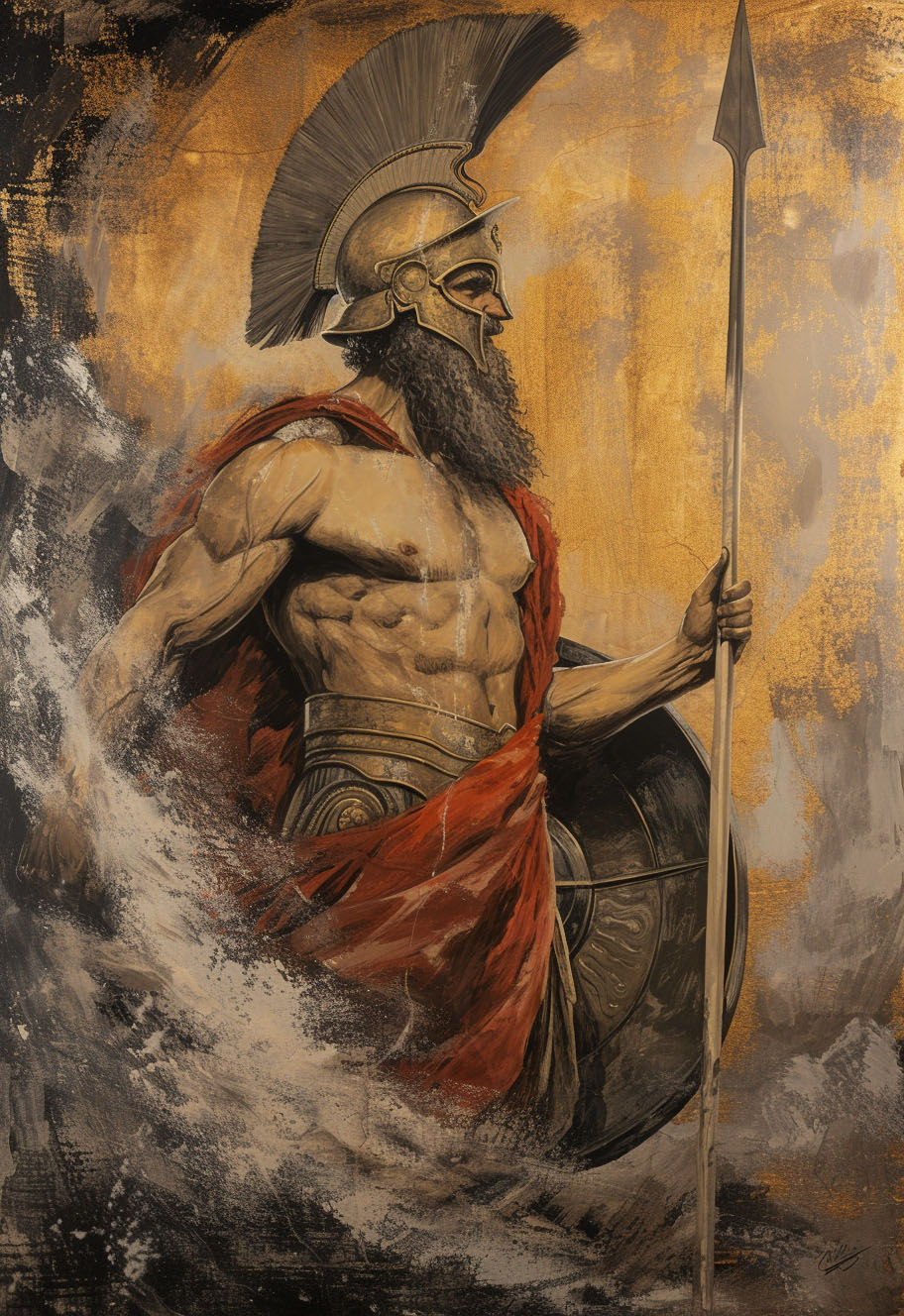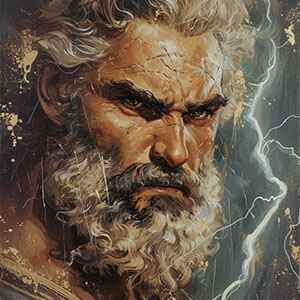Ares
In Greek mythology, Ares is the god of war, violence, and bloodshed. He is one of the twelve Olympian deities, the principal gods of the Greek pantheon. Here are key aspects of Ares in Greek mythology:
Parents: Zeus & Hera
Siblings: Hephaestus, Hebe, Athena, Apollo, Artemis, Aphrodite, Hermes, Persephone, Dionysus, Demeter
Consort: Aphrodite
Children: Deimos, Phobos, Eros, Harmonia

Parentage: Ares is the son of Zeus and Hera, making him one of the divine offspring of the king and queen of the Olympian gods.
Attributes and Symbols: Ares is often depicted in armor, wielding a spear or sword. His chariot is drawn by four fiery horses. The vulture and the dog are animals associated with Ares.
Personality and Character: Ares embodies the brutal and violent aspects of war. Unlike Athena, the goddess of strategic warfare and wisdom, Ares is associated with the chaos and carnage of battle.
Role in Warfare: Ares is primarily known as the god of war, but he represents the physical, violent, and destructive aspects of warfare rather than strategic or disciplined military tactics.
Offspring: Ares is the father of several figures in Greek mythology, including Deimos (Terror), Phobos (Fear), Eros (Love), Harmonia (Harmony), and various others. His children often reflect the dual nature of war, encompassing both its destructive and creative aspects.
Conflict with Athena: Ares is often portrayed in conflict with Athena, the goddess of strategic warfare. While Athena represents disciplined and strategic warfare, Ares embodies the chaotic and brutal aspects of battle.
Affairs and Relationships: Ares is sometimes associated with the goddess of love, Aphrodite. Their love affair is infamous, and they are often depicted together. In some versions of the myth, Ares is caught in an affair with Aphrodite by her husband Hephaestus, the god of craftsmanship.
Warrior Cult: Ares did not have a significant cult following in ancient Greece, and there were fewer temples dedicated to him compared to other gods. However, his worship was observed in some regions and during certain military festivals.
Mythological Stories: Ares is involved in various myths, including the Trojan War, where he supports the Trojans. His involvement often results in destructive and chaotic consequences.
Literary References: Ares is featured in many Greek literary works, including Homer's "Iliad" and "Odyssey." In the "Iliad," his impulsive and aggressive nature is highlighted.
Roman Equivalent: In Roman mythology, Ares is identified with Mars, the god of war.
While Ares is a god associated with the brutal and chaotic aspects of warfare, he is not as highly revered as Athena, who embodies strategic and disciplined warfare. Ares represents the raw and destructive force of battle, serving as a reminder of the harsh realities of war in Greek mythology.
Immediate Family
Quick Facts
- He is the son of Zeus and Hera.
- He is often depicted in armor, wielding a spear or sword.
- Ares embodies the brutal and violent aspects of war.
- He is the god of war, associated with physical, violent, and destructive aspects of warfare.
- Ares is the father of Deimos, Phobos, Eros, Harmonia, and others.
- Ares is in conflict with Athena, the goddess of strategic warfare.
- He is sometimes associated with Aphrodite.
- Ares did not have a significant cult following.
- He is involved in various myths, including the Trojan War.
- Ares is featured in Greek literary works, including Homer's "Iliad" and "Odyssey."
- In Roman mythology, Ares is identified with Mars.
Further Reading
Art &
Architecture
Ancient Greek art and architecture, with its harmonious proportions and timeless elegance, continue to inspire awe and admiration millennia later.
Discover
Greek Mythology & Mythical Characters
Greek mythology, a rich tapestry of gods, heroes, and mythical creatures, captivates the imagination with its tales of love, betrayal, and epic adventures that delve into the depths of the human psyche.
Discover
Ancient Greek History
Ancient Greek history, marked by remarkable achievements in democracy, philosophy, and warfare, shaped the foundation of Western civilization, leaving an indelible legacy of innovation and cultural influence that continues to resonate to this day.
Discover
Ancient Greek Olympics
The ancient Greek Olympics, held in Olympia every four years, celebrated athleticism, unity, and cultural pride, serving as a testament to the enduring spirit of competition and excellence that transcends time and borders.
Discover
Ancient Greek Wars
Ancient Greek wars, such as the Persian Wars and the Peloponnesian War, were pivotal conflicts that shaped the course of history, highlighting the struggle for power, independence, and the clash of civilizations in the ancient Mediterranean world.
Discover
Ancient Greek Culture and Society
Ancient Greek culture and society, characterized by its emphasis on art, philosophy, and civic engagement, fostered a vibrant intellectual and social landscape where innovation flourished, democracy thrived, and the pursuit of knowledge and excellence was celebrated as fundamental values of civilized life.
Discover

